ANDE’s research practice serves as a think tank for the SGB sector, translating data into insights and moving evidence to action.
Every entrepreneur operates within an ecosystem that determines the access to talent, finance, and markets that they need to grow their businesses. ANDE’s Ecosystem Snapshots provide data about financial and non-financial support available for small and growing businesses in a specific city or country.
GALI aims to rigorously investigate the effectiveness of the hundreds of accelerators around the world working to support early-stage entrepreneurs in growing and securing funding. ANDE launched GALI in 2015 in partnership with Emory University and a consortium of public and private funders. Add your accelerator to the directory or download the data for your own research and benchmarking.
The SGB Evidence Fund, a joint effort between ANDE and the International Growth Centre (IGC), supports collaborations between researchers and practitioners to understand the most effective ways to support SGBs and the economic and social impact of SGB growth.
ANDE collects and aggregates data and evidence on the SGB sector through our flagship State of the SGB Sector and Impact Investing in Latin America reports and other sector-building research.

Business development service (BDS) programmes, such as accelerators and incubators, are increasingly looked to as promising ways to help entrepreneurs enhance their business skills, expand their networks, and access investment. In Fiji, there is a small but quickly growing entrepreneurial ecosystem supported by over a dozen BDS programmes. This report seeks to characterize the BDS landscape and form recommendations for its continued growth based on international research and established best practices from other ecosystems across the globe.
In this report, the authors assess the practices of Fiji's BDS providers against the SCALE principles, a set of recommendations published in 2021 by the Argidius Foundation which reflect global best practices for BDS provision. This study identified a total of 21 BDS programmes in the Fijian ecosystem administered by 14 service providers, including eight accelerators, five incubators, and eight additional programmes such as co-working spaces, grantmaking facilities, and technical assistance. Based on desk research and interviews with programme managers, the authors assessed Fiji’s accelerator and incubator landscape as moderately applying the SCALE principles.
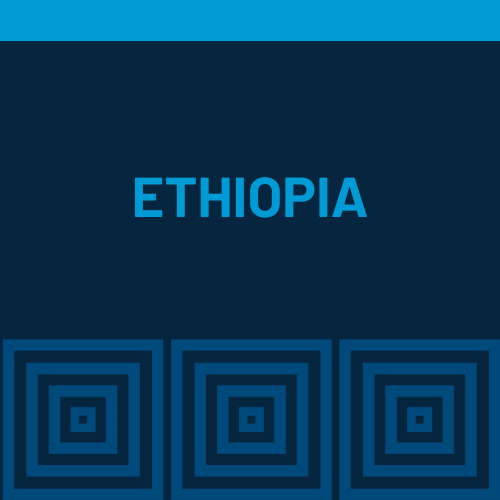
Every entrepreneur operates within an ecosystem that determines the access to talent, finance, and markets that they need to grow their business. ANDE’s Entrepreneurial Ecosystem Maps serve as a tool for stakeholders to learn about the organizations providing support to small and growing businesses (SGBs) in a specific city, region, or country.
This mapping identified 140 organizations and nearly 170 distinct resources supporting entrepreneurs across Ethiopia. The online mapping provides a filterable directory of these organizations, categorized by sector, location, and support type. The mapping is complemented by a report analyzing the data and synthesizing key trends in the ecosystem.
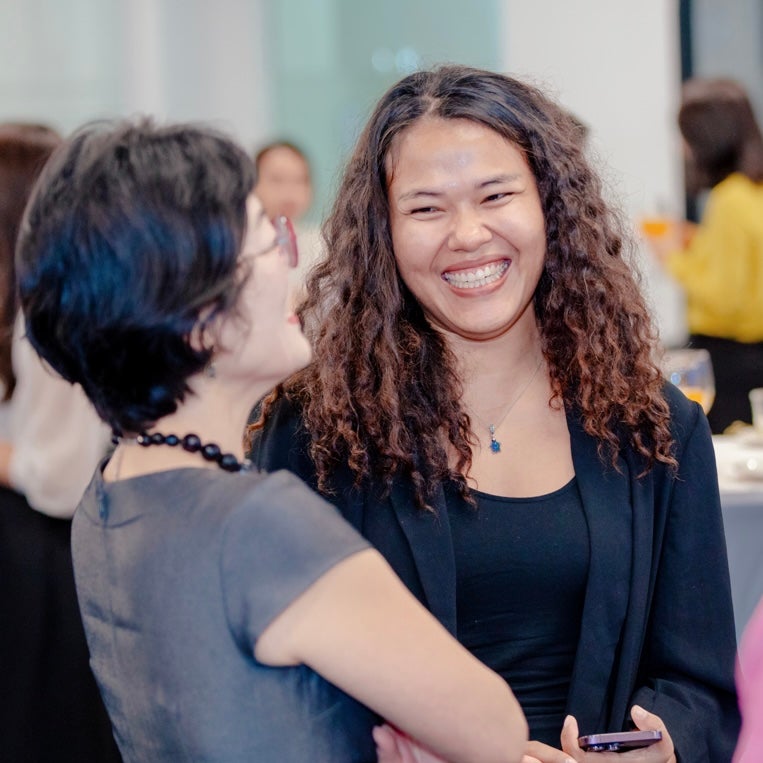
The concept of gender-lens acceleration has taken hold in recent years, with various toolkits outlining how to be more gender inclusive at every step of the acceleration process, from selection to programming and alumni support. However, it is not well understood how effective these strategies have been in producing more equitable outcomes for women. This report aims to fill that information gap by synthesizing the research on accelerating women-led ventures, exploring case studies of two accelerator programs in Asia that have outsized impacts for such ventures, and spotlighting other programs with unique program models or perspectives.
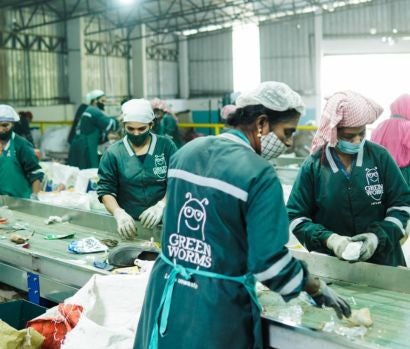
This landscape guide is intended to outline India’s current context in recycling and circularity, with a focus on the investment potential, opportunities and business models in the ten most significant waste streams in India. It provides a framework for how investment potential in a waste stream can be determined, which covers five areas that define that potential: market size and growth; investable start-up pipeline; product readiness; policy support; financing needs and gaps. The guide also includes a historical outline of investments and funding in each waste stream and outlines the roles and participation of various types of equity funders, along with the potential and participation of non-dilutive funding options.
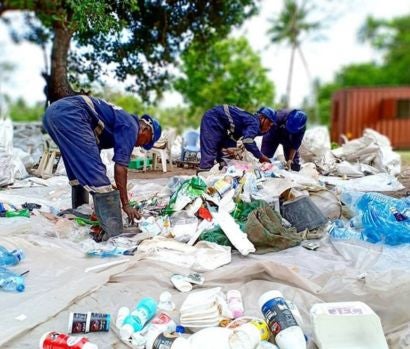
Kenya's waste management and circularity sector offers significant opportunities for investors, driven by economic growth, increasing waste generation, growing regulations and innovations. This introductory guide is the first in a series that also includes investment guides that deep dive into each of the highest opportunity sub-sectors in Kenya’s waste and circularity sector: plastic waste, wastewater, organic waste and integrated waste management. These guides provide further information on trends, opportunities, policies and challenges, as well as further details on the main identified business models and their financing needs and case studies of successful businesses.
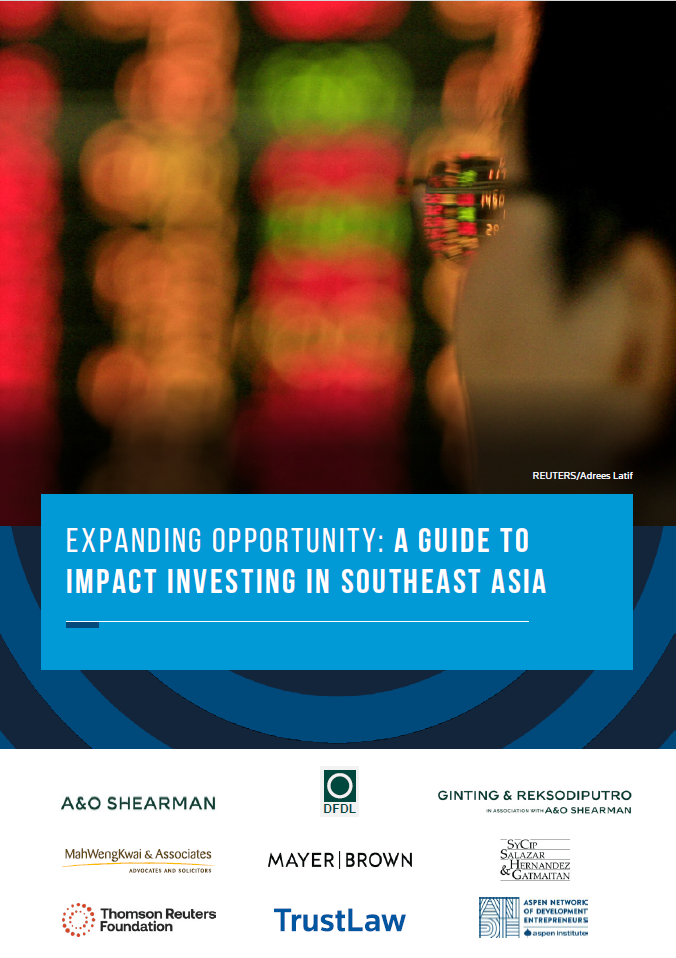
The Thomson Reuters Foundation champions economies that are equitable, participatory, and sustainable, with a focus on environmental respect. Impact investing is crucial for addressing social and environmental inequities but remains underutilized in Southeast Asia. To bridge this gap, the Aspen Network of Development Entrepreneurs (ANDE) partnered with TrustLaw, the TRF's global pro bono service, to enhance understanding of local impact investing regulations in 7 different countries in Southeast Asia: Thailand, Vietnam, Singapore, Indonesia, Malaysia, Myanmar, and the Philippines. Special thanks go to A&O Shearman, DFDL, Mayer Brown, MahWengKwai & Associates, and SyCip Salazar Hernandez & Gatmaitan for their pro-bono support. This guide aims to assist social enterprises, incubators, and investors in navigating local regulations and fostering greater investment in regional startups and their social missions.
Measurement is about more than just accountability. We believe measurement can build more impactful businesses, improve resource allocation, and support sector-wide efficiency.
When impact metrics are integrated with financial and operational metrics, they can help organizations develop better products and services, make better investment decisions, and become more efficient in achieving impact. And when evaluations support a collective learning agenda rather just a single project, they build knowledge for the entire sector.
ANDE holds convenings and workshops and provides resources to our members to help them better measure the economic, social, and environmental impact of their work. Refer to our Knowledge Hub for the latest guidance and tools and see our IMM-related convenings and trainings.
